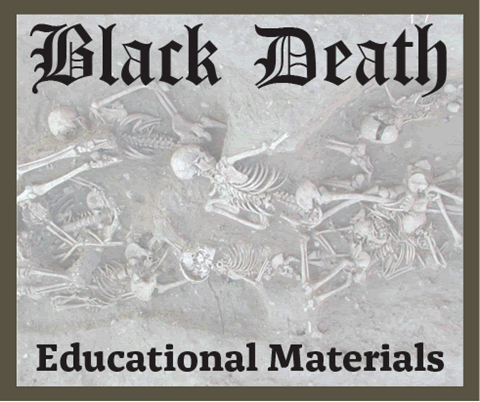 |
| Black Plague Educational Materials |
|---|
| www.studenthandouts.com > World History > Black Death |
| Black Plague Maps and Pictures | Black Plague Worksheets |
| Black Plague Outlines and PowerPoints | Black Plague Study Games |
| Black Plague Books and Films | Black Plague Miscellany |
The plague, specifically referring to the Black Death, which struck Europe in the 14th century, had a profound and far-reaching impact on the continent. It is a fascinating topic for World History students, and our free educational materials are here to help them learn all about it. The Black Death was one of the deadliest pandemics in human history, and its consequences touched various aspects of European society, economy, culture, and demographics. Here are some of the major effects of the plague on Europe:
 Massive Mortality: The Black Death caused an immense loss of life. It is estimated that between 25% and 60% of Europe's population perished during the pandemic. Entire communities and regions were depopulated, and death tolls varied across different areas.
Massive Mortality: The Black Death caused an immense loss of life. It is estimated that between 25% and 60% of Europe's population perished during the pandemic. Entire communities and regions were depopulated, and death tolls varied across different areas. Labor Shortages: The catastrophic loss of life resulted in severe labor shortages. With a significantly reduced workforce, wages for laborers and peasants increased, giving rise to demands for higher pay and better working conditions. This led to a shift in power dynamics between landowners and laborers. Economic Disruption: The Black Death disrupted economic activities across Europe. Trade routes were affected, and some industries and businesses collapsed due to labor shortages. This period of economic turmoil also contributed to inflation and changes in market dynamics. Social Upheaval: The demographic changes and labor shortages caused by the plague led to social upheaval. Peasants and laborers began to demand greater rights and freedoms, challenging the traditional feudal system. Revolts and social unrest occurred in various regions. Religious Impact: The plague had a profound religious impact. Many people turned to religion for answers and solace in the face of such widespread death and suffering. There were religious revivals, and some sought to atone for perceived sins through acts of piety and charity. Cultural Changes: The trauma of the Black Death influenced European culture. Themes of death, mortality, and the transience of life became prevalent in art, literature, and philosophy. The genre of memento mori art, which reminded people of their own mortality, emerged during this time. Medical Advances: In response to the plague, there were efforts to better understand and combat the disease. While medical knowledge was limited at the time, the experience with the Black Death contributed to the development of early public health measures and quarantine practices. Urbanization: The plague's impact on cities varied, but some urban areas experienced significant depopulation. However, as labor shortages increased wages, urban centers also attracted migrants seeking economic opportunities, contributing to urbanization in the long run. Trade and Commerce: Trade routes and commercial activities were disrupted initially, but Europe eventually recovered and adapted. New trade routes and markets emerged, and Europe's global trade connections expanded in the aftermath of the pandemic. Demographic Consequences: The Black Death had long-term demographic consequences. It took several centuries for Europe's population to fully recover to pre-plague levels. Some regions experienced more rapid population growth, while others remained sparsely populated for centuries. Political Changes: The upheaval caused by the plague also had political ramifications. In some cases, rulers struggled to maintain control over their territories in the face of social and economic challenges. This period contributed to changes in political structures and governance. The Black Death, while devastating, was a turning point in European history. It accelerated shifts in society, economics, and culture that had been underway for some time. It also played a role in shaping the subsequent development of Europe in the late medieval and early modern periods. Our free educational materials are designed to facilitate student learning of the Black Death. |
| www.studenthandouts.com > World History > Black Death |






